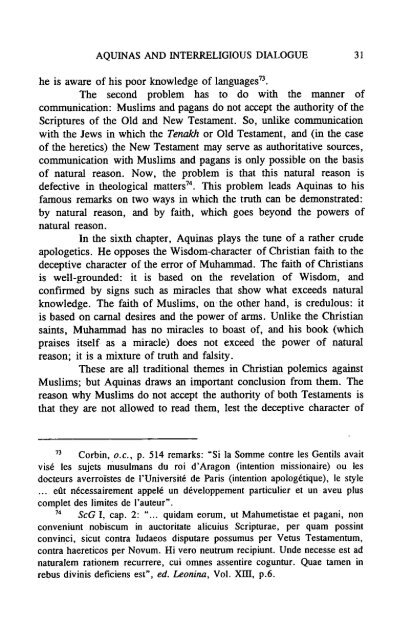Jaarboek Thomas Instituut 1997 - Thomas Instituut te Utrecht
Jaarboek Thomas Instituut 1997 - Thomas Instituut te Utrecht
Jaarboek Thomas Instituut 1997 - Thomas Instituut te Utrecht
You also want an ePaper? Increase the reach of your titles
YUMPU automatically turns print PDFs into web optimized ePapers that Google loves.
AQUINAS AND INTERRELIGIOUS DIALOGUE 31<br />
he is aware of his poor knowledge of languages".<br />
The second problem has to do with the manner of<br />
communication: Muslims and pagans do not accept the authority of the<br />
Scriptures of the Old and New Testament. So, unlike communication<br />
with the Jews in which the Tenakh or Old Testament, and (in the case<br />
of the heretics) the New Testament may serve as authoritative sources,<br />
communication with Muslims and pagans is only possible on the basis<br />
of natural reason. Now, the problem is that this natural reason is<br />
defective in theological mat<strong>te</strong>rs". This problem leads Aquinas to his<br />
famous remarks on two ways in which the truth can be demonstra<strong>te</strong>d:<br />
by natural reason, and by faith, which goes beyond the powers of<br />
natural reason.<br />
In the sixth chap<strong>te</strong>r, Aquinas plays the tune of a rather crude<br />
apologetics. He opposes the Wisdom-charac<strong>te</strong>r of Christian faith to the<br />
deceptive charac<strong>te</strong>r of the error of Muhammad. The faith of Christians<br />
is well-grounded: it is based on the revelation of Wisdom, and<br />
confirmed by signs such as miracles that show what exceeds natural<br />
knowledge. The faith of Muslims, on the other hand, is credulous: it<br />
is based on carnal desires and the power of arms. Unlike the Christian<br />
saints, Muhammad has no miracles to boast of, and his book (which<br />
praises itself as a miracle) does not exceed the power of natural<br />
reason; it is a mixture of truth and falsity.<br />
These are all traditional themes in Christian polemics against<br />
Muslims; but Aquinas draws an important conclusion from them. The<br />
reason why Muslims do not accept the authority of both Testaments is<br />
that they are not allowed to read them, lest the deceptive charac<strong>te</strong>r of<br />
73 Corbin, O.C., p. 514 remarks: "Si la Somme contre les Gentils avait<br />
visé les sujets rnusulmans du roi d'Aragon (in<strong>te</strong>ntion missionaire) ou les<br />
doc<strong>te</strong>urs averroïs<strong>te</strong>s de I'Université de Paris (in<strong>te</strong>ntion apologétique), Ie style<br />
... eût nécessairement appelé un développement particulier et un aveu plus<br />
complet des Iimi<strong>te</strong>s de I'au<strong>te</strong>ur".<br />
74 ScG I, cap. 2: " ... quidam eorum, ut Mahumetistae et pagani, non<br />
conveniunt nobiscum in auctorita<strong>te</strong> alicuius Scripturae, per quam possint<br />
convinci, sicut contra Iudaeos disputare possumus per Vetus Testamentum,<br />
contra haereticos per Novum. Hi vero neutrum recipiunt. Unde neeesse est ad<br />
naturalem rationem recurrere, cui omnes assentire coguntur. Quae tarnen in<br />
rebus divinis deficiens est", ed. Leonina, Vol. xm, p.6.








